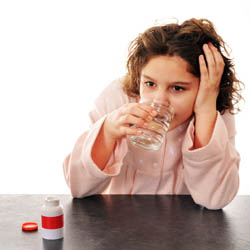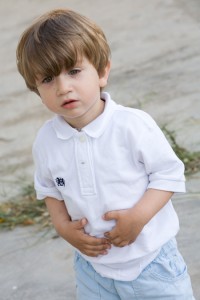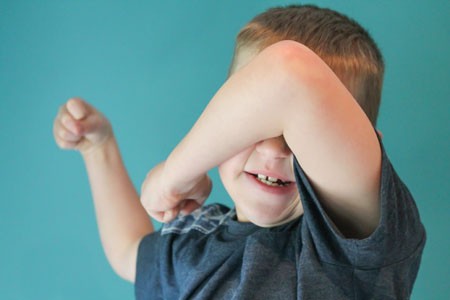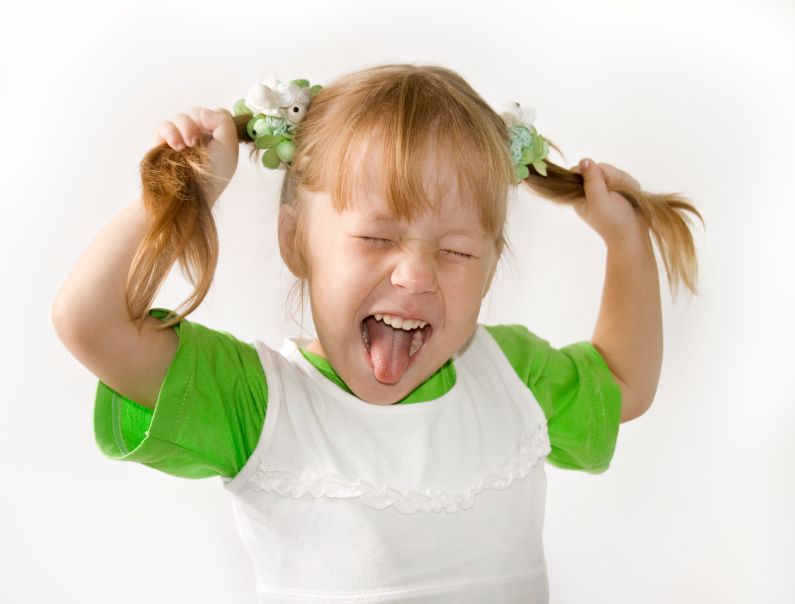Anxiety, Depression, Unstable Mood, and Low-Level Mania Best Predictors of Bipolar Disorder
Researchers are looking for better ways of predicting whether children at risk for bipolar disorder will go on to develop the illness. A 2015 study by David Axelson and colleagues in the American Journal of Psychiatry reported that in the offspring of parents with bipolar disorder, diagnoses of sub-threshold mania, depression, and disruptive behavior disorders were associated with subsequent diagnosis of full-blown Bipolar I or Bipolar II disorders six to seven years later.
More recently, in an article by Danella M. Hafeman and colleagues in the American Journal of Psychiatry, the same group of investigators has examined how symptoms (rather than categorical diagnoses, as in the earlier study) predict the development of bipolar disorder. In children and adolescents at high risk for bipolar disorder (because they have a parent with the disorder) three types of symptoms were the best predictors of later bipolar disorder: anxiety/depression at the time participants entered the study, unstable mood or irritability both when entering the study and shortly before a bipolar diagnosis, and low-level manic symptoms observed shortly before diagnosis.
The earlier the age at which a parent was diagnosed with a mood disorder, the greater the risk that the offspring would also be diagnosed with bipolar disorder. Youth with all four risk factors (anxiety or depression, mood changes, low-level mania, and a parent who was diagnosed with a mood disorder at an early age) had a 49 percent chance of developing bipolar disorder, compared to a 2 percent chance among those without those risk factors.
Childhood onset of bipolar disorder and long delays until first treatment for depression or mania are both significant predictors of a poor outcome in adulthood compared to adult onsets and shorter delays to treatment. Read more
Children at Risk for Bipolar Disorder May Have Adverse Reactions to Antidepressants
 At the 2015 meeting of the American Academy of Child and Adolescent Psychiatry, researcher Jeffrey R. Strawn reported that among children at high risk for bipolar disorder (because of a family history of the disorder) who are prescribed antidepressants for depression and anxiety, adverse reactions are common. These reactions include irritability, aggression, impulsivity, and hyperactivity, and often lead to discontinuation of the antidepressant treatment.
At the 2015 meeting of the American Academy of Child and Adolescent Psychiatry, researcher Jeffrey R. Strawn reported that among children at high risk for bipolar disorder (because of a family history of the disorder) who are prescribed antidepressants for depression and anxiety, adverse reactions are common. These reactions include irritability, aggression, impulsivity, and hyperactivity, and often lead to discontinuation of the antidepressant treatment.
Younger patients at risk for bipolar disorder were more likely to have an adverse reaction to antidepressants. Risk of an adverse reaction decreased 27% with each year of age.
More Evidence N-Acetylcysteine Added to Risperidone Improves Irritability in Autism
We reported in 2014 that researchers Ahmad Ghanizadeh and Ebrahim Moghimi-Sarani had found that the over-the-counter nutritional supplement n-acetylcysteine (NAC) added to the atypical antipsychotic risperidone reduced irritability in autism more than placebo added to risperidone.
A randomized, double-blind, placebo-controlled clinical trial published by M. Nikoo and colleagues in Clinical Neuropharmacology in 2015 replicated these results. Forty children with autism disorders aged 4–12 years were randomized to receive either risperidone plus NAC or risperidone plus placebo. Risperidone doses were between 1 and 2 mg/day, and NAC doses were 600 to 900 mg/day. By the end of the 10-week study, those children who received NAC had significantly greater reductions in irritability and hyperactivity/noncompliance than those who received placebo.
Editor’s Note: Three placebo-controlled studies have supported the efficacy of NAC in autism. One 2012 study, by A.Y. Hardan in Biological Psychiatry, evaluated monotherapy with oral NAC. In the other two, NAC was added to treatment with risperidone.
Depression in Children with Inflammatory Bowel Disease
 The incidence of irritable bowel disease has been increasing in recent years as obesity has increased. At a symposium at the 2014 meeting of the American Academy of Child and Adolescent Psychiatry, researcher Eva Szigethy discussed depression in inflammatory bowel disease, which most often involves Crohn’s disease or ulcerative colitis. These conditions are associated with increased levels of inflammatory markers such as interleukin 1 (IL-1), interleukin 6 (IL-6), and TNF alpha, and these in turn induce the acute phase reactive protein called c-reactive protein (CRP). The interleukins peak in the first 12 hours after an inflammatory challenge and CRP peaks at 48 hours and returns to normal at 120 hours. Il-6 is most closely associated with the somatic symptoms of inflammation, including depression, fatigue, loss of appetite, and decreased sleep, while TNF alpha is associated with non-somatic symptoms, such as irritability.
The incidence of irritable bowel disease has been increasing in recent years as obesity has increased. At a symposium at the 2014 meeting of the American Academy of Child and Adolescent Psychiatry, researcher Eva Szigethy discussed depression in inflammatory bowel disease, which most often involves Crohn’s disease or ulcerative colitis. These conditions are associated with increased levels of inflammatory markers such as interleukin 1 (IL-1), interleukin 6 (IL-6), and TNF alpha, and these in turn induce the acute phase reactive protein called c-reactive protein (CRP). The interleukins peak in the first 12 hours after an inflammatory challenge and CRP peaks at 48 hours and returns to normal at 120 hours. Il-6 is most closely associated with the somatic symptoms of inflammation, including depression, fatigue, loss of appetite, and decreased sleep, while TNF alpha is associated with non-somatic symptoms, such as irritability.
Szigethy found that in a randomized trial of cognitive behavior therapy versus supportive therapy in children with inflammatory bowel disease, inflammatory activity decreased significantly with cognitive behavioral therapy, and the therapy particularly helped the somatic symptoms of fatigue, sleep disorder, anhedonia (loss of interest in activities once enjoyed), appetite suppression, and mood dysregulation. In contrast, when antidepressants are given to those with inflammatory bowel disease, the drugs are not particularly helpful for these somatic symptoms. Inflammatory bowel diseases are treated with steroids in 21% of patients and with a genetically engineered drug called infliximab in 30%. Adding cognitive behavioral therapy to the regimen decreases CRP and red cell sedimentation rate, an associated measure of inflammation.
The discussant of the symposium on inflammation, Frank Lotrich, described how inflammation alters sleep, and this appeared to interact with genetic risk of illness. For example, those with certain genetic variations (the short SS allele of the serotonin transporter and the val-66-met allele of proBDNF) were most likely to experience sleep disturbance following treatment with interferon gamma, a treatment that fights the virus that causes Hepatitis C, creating inflammation in the process. Interferon gamma causes depression in about one-third of the patients who take it.
Lotrich pointed out that low levels of omega-3 fatty acids are associated with increased irritability and anger, and this is related to the presence of the A allele of TNF alpha. TNF alpha is also closely linked with irritability and anger, suggesting the possible benefits of omega-3 fatty acid supplementation to target irritability and anger more selectively. This would be consistent with the data of researcher Mary A. Fristad.
Il-6 is closely associated with the somatic symptoms of depression, particularly poor sleep, which is itself associated with increases in depression. This is consistent with inflammation being a marker of poor response to antidepressants; Lotrich noted that the selective serotonin reuptake inhibitors (SSRIs), which help depression, are far more effective against the non-somatic aspects of depression and less effective against low energy, decreased interest, and fatigue. However, extrapolating from the data on inflammatory bowel disease, cognitive behavioral therapy may be most helpful on these somatic symptoms.
Combination of N-acetylcysteine and Risperidone Improves Irritability in Autistic Disorders More Than Placebo and Risperidone
In a 2013 study of 40 children and adolescents with autism spectrum disorders published by Ahmad Ghanizadeh and Ebrahim Moghimi-Sarani in the journal BMC Psychiatry, the combination of the over-the-counter nutritional supplement n-acetylcysteine (NAC) and the atypical antipsychotic risperidone alleviated irritability more than the combination of placebo and risperidone. Side effects were mild. The data extend 2012 observations by A.Y. Hardan et al. in which NAC improved irritability and stereotypy (repeated behavior) in autism more than placebo did.
The two studies taken together support the effectiveness of NAC prescribed either alone or in conjunction with an atypical antipsychotic for the treatment of autism.
Irritable, Elated, And Combined Bipolar Subtypes in Children Are Similar
Research on early-onset bipolar disorder has often hinged on identifying the key characteristics of the disorder. At a symposium on the course of bipolar disorder in children at the 2013 meeting of the American Academy of Child and Adolescent Psychiatry (AACAP), Jeff Hunt of Brown University discussed findings from COBY, the Collaborative Child Bipolar Network. He described the course of illness in 446 children with bipolar disorder, including 10% who had irritability at baseline, 15% who had elated mood at baseline, and a majority (75%) who had both irritability and elation at baseline.
Most factors such as positive family history of bipolar illness and comorbidities including attention deficit hyperactivity disorder (ADHD) did not differ across the three groups. The three subtypes (irritable, elated, or mixed) did not remain stable, and most of the children eventually converted to the combined irritable and elated subtype. These data contrast with those of Ellen Liebenluft et al., who found that those with severe mood dysregulation or chronic irritability (but not other key characteristics of bipolar disorder) did not go on go on to receive a bipolar diagnosis and tended not to have a family history of bipolar disorder.
NAC Improves Irritability and Repetitive Behaviors in Children with Autism
 The antioxidant N-acetylcysteine (NAC), which can be found in health food stores, seems to be effective for irritability and repetitive behaviors in children with autism. In a small controlled study that was published by Hardan et al. in the journal Biological Psychiatry in 2012, 33 mostly male children with autism (aged 3-12 years) received either placebo or NAC at doses of 900mg daily for 4 weeks, followed by 900mg twice daily for 4 weeks, then 900mg three times a day for 4 weeks. Beginning in week 4, the children receiving NAC showed significantly improved irritability scores, and a trend for improvement in repetitive behaviors.
The antioxidant N-acetylcysteine (NAC), which can be found in health food stores, seems to be effective for irritability and repetitive behaviors in children with autism. In a small controlled study that was published by Hardan et al. in the journal Biological Psychiatry in 2012, 33 mostly male children with autism (aged 3-12 years) received either placebo or NAC at doses of 900mg daily for 4 weeks, followed by 900mg twice daily for 4 weeks, then 900mg three times a day for 4 weeks. Beginning in week 4, the children receiving NAC showed significantly improved irritability scores, and a trend for improvement in repetitive behaviors.
Social responsiveness did not improve significantly, but the children receiving NAC did show some improvement in some areas of social behavior, such as social cognition and autism mannerisms.
There were few side effects associated with NAC. The most significant were gastrointestinal side effects, but these were mild, especially when compared with the side effects associated with FDA-approved treatments for autism, such as the atypical antipsychotics risperidone and aripiprazole.
The authors of the study plan to expand their research in a study of more than 100 children with autism.
Editor’s Note: It should we previously summarized this study in the BNN based on research presented by Fung et al. at a meeting of the American Academy of Child and Adolescent Psychiatry two years ago. The study has now been published.
Arbaclofen May Improve Social Behavior in Fragile X Syndrome and Irritability in Autism
 Fragile X syndrome is a genetic condition that is the most common single-gene cause of autism and inherited cause of intellectual disability. In addition to mental disabilities it is also characterized by certain physical characteristics (elongated face, protruding ears, and large testes in boys), stereotypic movements such as hand-flapping, and social anxiety.
Fragile X syndrome is a genetic condition that is the most common single-gene cause of autism and inherited cause of intellectual disability. In addition to mental disabilities it is also characterized by certain physical characteristics (elongated face, protruding ears, and large testes in boys), stereotypic movements such as hand-flapping, and social anxiety.
When autism is associated with Fragile X, a mutation in the Fragile X gene is responsible for the autism. (It is also possible to have autism without Fragile X, or to have Fragile X without autism.) Fragile X is a genetic disorder like Downs Syndrome, while autism is a complex behavioral disorder, likely involving multiple genetic and environmental vulnerabilities.
A new drug called arbaclofen seems to improve social avoidance and problem behaviors in adults and children with Fragile X. Researchers hypothesize that normal social stimuli overwhelm a Fragile X patient because of a defect in inhibition, and arbaclofen acting on presynaptic GABA-B receptors reduces glutamate release, thereby reducing the overactive signaling associated with this defect.
In a 6-week placebo-controlled study of arbaclofen among 63 patients with Fragile X ranging in age from 6 to 39, patients 11 years old and younger received 10mg twice a day and patients 12 and up received 10mg three times a day. The drug was well-tolerated, with only a few reports of sedation or headache. While problem social behaviors and neurobehavioral function improved, irritability did not. The study considered irritability because that is the aspect of autism most often improved by other Federal Drug Administration-approved drugs for autism, such as risperidone and aripiprazole. In another study of arbaclofen in autism spectrum disorders, it did improve irritability and agitation.
Editor’s Note: The GABA-B agonist arbaclofen has previously shown positive effects in motor spasticity. The positive effects noted here in the social domain of autism spectrum disorders and Fragile X are very promising.
Irritability and Unipolar Depression in Kids
 At the 2012 Pediatric Bipolar conference sponsored by the Ryan Licht Sang Foundation, Graham J. Emslie gave a talk on irritable mood and unipolar depression in youth.
At the 2012 Pediatric Bipolar conference sponsored by the Ryan Licht Sang Foundation, Graham J. Emslie gave a talk on irritable mood and unipolar depression in youth.
Irritability is common in unipolar depression. Emslie suggested that if a child’s irritability is severe and the child destroys objects and denies being irritable, bipolar disorder might be likely. Irritable unipolar depressed children will generally acknowledge being irritable.
Emslie reported that 96% of youth in his randomized placebo-controlled studies of selective serotonin reuptake inhibitor antidepressants (SSRIs) recovered from their unipolar depression, but 46.6% relapsed. Those children with residual depressive symptoms were at double the risk for relapse into a depression compared to those who remitted completely. In those without residual depressive symptoms, there were no relapses if the children stayed on their medications.
Children were excluded from Emslie’s study if they had a positive family history of bipolar disorder, and perhaps because of this, very few participants switched into mania with antidepressants.
MORAL: Treat to remission and stay on the antidepressants associated with the remission. This has previously been found to be important for adults as well. (Emslie added that he would advise that a child stay on an antidepressant for at least a year after a remission was achieved, and longer if the child had difficulties in academic performance or relationships at school.)
Children with unipolar major depression who had a few manic symptoms at a subsyndromal level had poorer outcomes in Emslie’s study. The presence of subsyndromal manic symptoms in bipolar depressed adults is a risk factor for increased switching into mania when antidepressants are added to a mood stabilizer.
Comorbid substance abuse is another risk factor for poor outcome in childhood depression.
N-acetylcysteine Improved the Irritability Associated with Autism
 At the 57th Annual Meeting of the American Academy of Child and Adolescent Psychiatry (AACAP) in October 2010, Lawrence Fung of Stanford University reported that N-acetylcysteine (NAC), a compound sold over-the-counter in health food stores, improved irritability and other symptoms of autism in children aged 8 to 17. In this double-blind, randomized study of NAC compared with placebo, the children who received NAC were treated with 900mg once a day for four weeks, then 900mg BID (twice a day) for four weeks, and finally 900mg TID (three times a day) for the last four weeks of this three-month study. These doses significantly improved irritability and stereotypy (repetitive behaviors) compared with placebo. Side effects were minimal.
At the 57th Annual Meeting of the American Academy of Child and Adolescent Psychiatry (AACAP) in October 2010, Lawrence Fung of Stanford University reported that N-acetylcysteine (NAC), a compound sold over-the-counter in health food stores, improved irritability and other symptoms of autism in children aged 8 to 17. In this double-blind, randomized study of NAC compared with placebo, the children who received NAC were treated with 900mg once a day for four weeks, then 900mg BID (twice a day) for four weeks, and finally 900mg TID (three times a day) for the last four weeks of this three-month study. These doses significantly improved irritability and stereotypy (repetitive behaviors) compared with placebo. Side effects were minimal.
Editor’s note: The potential for a safe compound such as N-acetylcysteine to show efficacy in autism is striking. Currently only risperidone and aripiprazole are FDA-approved for effectiveness treating irritability in autism. There has also been a positive study of valproate compared with placebo in autism, although it is not FDA-approved for this purpose.
Most double-blind, placebo controlled clinical trials of NAC have been in adults, so this is the first report that suggests NAC can safely be used in children.
NAC’s ability to improve irritability in autism raises the possibility that this drug may be useful in the treatment of irritability and repetitive behaviors in bipolar disorder, particularly since N-acetylcysteine has also been reported to improve mood, especially depression, in adults with bipolar disorder in the studies of Mike Berk and colleagues published in Biological Psychiatry in 2008.
This study adds to the evidence that suggests N-acetylcysteine may reset the brain’s habit system in the ventral striatum (also called the nucleus accumbens), which is involved in the assessment of the reward value of a variety of substances of abuse and behaviors (as described in BNN Volume 14, Issue 1 from 2010). NAC improves a number of habit-related syndromes including cocaine, heroin, and gambling addictions, trichotillomania (compulsive hair-pulling), and now the irritability and stereotypic behaviors of autism.
In light of NAC’s profile of efficacy and safety, systematic exploration of the drug in childhood-onset bipolar illness is indicated. We are aware of at least one group that is planning such a study.





